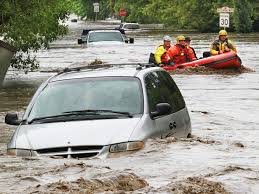Anticipation of the rainy season, which is the planting season, is usually overshadowed by growing anxiety over imminent threat of flooding followimg predictions by Nigeria’s meteorological agency, TOPE SUNDAY writes.
The Nigerian Meteorological Agency (NiMet) has forecasted above average rainfall for 2024, prompting widespread concern. In 2023, severe floods affected over 2 million people, displacing more than 300,000 and claiming hundreds of lives.
The agricultural sector, which employs about 70 per cent of the population, was particularly hard hit, with losses amounting to over $1 billion.
This year, NiMet’s warning was clear that the flood risk remained high, especially in flood-prone states like Lagos, Delta, Anambra, and Kogi.
Early warning
As early as April, the federal government officially unveiled the 2024 Annual Flood Outlook (AFO) to mitigate flood risks and ensure food security in Nigeria.
The Minister of Water Resources and Sanitation, Professor Joseph Terlumun, who unveiled the 2024 AFO with the theme: “Promoting The Use of Data Analytics & Modeling for Flood Risk Assessments and Food Security,” revealed the significant predictions, which indicated that 148 Local Government Areas (LGAs) in 31 states of the federation are at risk of high flood, while 249 LGAs in 35 states and the Federal Capital Territory (FCT) are within moderate flood risk areas.
According to him, the states include Adamawa, Akwa-Ibom, Anambra, Bauchi, Bayelsa, Benue, Borno, Cross-River, Delta, Ebonyi, Edo, Imo, Jigawa, Kaduna, Kano, Katsina, Kebbi, Kogi, Kwara, Lagos, Nasarawa, Niger, Ogun, Ondo, Osun, Oyo, Plateau, Rivers, Sokoto, Taraba, and Yobe.
He also highlighted that high flood risks were to be expected in the areas across three distinct seasons: April, May, and June (AMJ); July, August, and September (JAS); and October and November (ON), and emphasized the alignment of the AFO with the Presidential Agenda on Food Security, aimed at enhancing agriculture resilience among vulnerable communities by reducing exposure to climate-related disasters and leveraging the positive effects of flooding for sustainable growth and economic development.
FCT warns, too
Also, the FCT Emergency Management Department,(FEMD), in a release dated June 24, 2024, placed its vanguards and the local emergency management committees in the six area councils on alert following early warnings of possible flooding in the territory.
Quoting a weather outlook issued by the Nigeria Meteorological Agency (NiMet), FEMD said isolated thunderstorms are likely over parts of the FCT, Nasarawa, Kogi, Benue and Plateau, and advised that strong winds may precede the rains in areas where the thunderstorms are likely to occur and urged the public to take adequate precaution.
Also, FEMD warned FCT may experience river flooding from neighbouring states predicted to experience heavy flooding.
The release quoted the Alacting Director General of FEMD, Mrs Florence Dawon Wenegieme, as saying that the Department has put in place mitigative measures around the city.
She said the Search and Rescue Team were on alert, while local divers have been posted to vulnerable locations, adding that LEMC in the six area councils and Vanguards have also been informed.
The DG also appealed to residents to always use the 112 emergency toll-free number in the event of an emergency.
Impact
According to experts, flooding has severe economic consequences. Nigeria’s agricultural sector, which contributes about 24 per cent to the GDP, is particularly vulnerable. Floods disrupt planting and harvesting seasons, leading to food shortages and price hikes.
Last year’s floods caused a significant increase in the prices of staple foods such as rice and maize, compounding the struggles of many households. With similar conditions predicted for 2024, the economic outlook remains bleak.
Also, environmental experts have warned that the long-term effects of repeated flooding are profound. Soil erosion, loss of arable land, and displacement of communities are just some of the lasting consequences.
“Flooding is not just a short-term disaster; it poses a long-term threat to our development and sustainability,” a report quoted Dr Biodun Adebayo, an environmental scientist at the University of Ibadan, as saying.
Mounting anxiety
Nigerians have continued to express concern over the impending flooding forecasted for 2024. The Nigeria Hydrological Services Agency (NIHSA) has identified 148 local government areas across 31 states, including major urban centres and coastal regions, as high-risk zones for flooding.
This includes areas like Lagos, Port Harcourt, and Abuja, which are expected to experience flash and urban flooding due to climate change and infrastructure issues.
Also, some of them have expressed concern and anxiety, recalling the devastating impacts of previous floods on their communities. Social media platforms and local forums are filled with residents urging the government to take more proactive measures to prevent disasters.
Some residents are sceptical about the effectiveness of governmental interventions, citing past failures and inadequate responses.
As the anxiety is palpable in communities across the country, a local fisherman in Lokoja, Kogi State, Musa Abdullahi, recalled the impact of last year’s floods, adding: “We lost everything. Our homes, our boats, our source of income. Now, every time it rains, we fear the worst.”
Also in Lagos, the densely populated coastal city, residents are equally worried.
A resident of the state, and a mother of three, Mrs Funmi Adewale, a mother of three, said: “We have done what we can to prepare, but when the rain comes, it’s like nothing can stop the water. We’re afraid for our homes and our safety.”
Similarly, a resident of Nyanya, an Abuja suburb, Mr John Mark, expressed fear over the impending flooding as predicted by the relevant government agencies, saying that they have been battling floods every rainy season, even after clearing the drainages around them.
“We have lost millions of naira worth of goods and property to flooding in this area, and we are afraid that if nothing is done this year, property or even lives may be lost to the flood. We have started seeing signs that it will rain heavily this year since the first rain had caused serious flooding,’’ he said.
Another resident of the FCT, Abdullahi Mohammed, on his part, warned Nigerians against blocking drainages, adding that nature will fight back, resulting in a flood.
He said: ” I wish to urge the government to take precautions against the impending doom because if something is not done urgently, it result in a monumental loss. Governments at all levels should be proactive in taking a bold step to address the issue of flooding in the country in general.”




